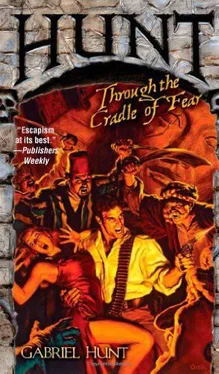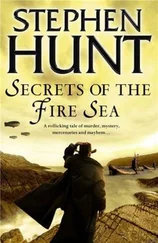Gabriel Hunt - Hunt Through the Cradle of Fear
Здесь есть возможность читать онлайн «Gabriel Hunt - Hunt Through the Cradle of Fear» весь текст электронной книги совершенно бесплатно (целиком полную версию без сокращений). В некоторых случаях можно слушать аудио, скачать через торрент в формате fb2 и присутствует краткое содержание. Год выпуска: 2011, Издательство: Dorchester Publishing Co., Inc., Жанр: Старинная литература, на английском языке. Описание произведения, (предисловие) а так же отзывы посетителей доступны на портале библиотеки ЛибКат.
- Название:Hunt Through the Cradle of Fear
- Автор:
- Издательство:Dorchester Publishing Co., Inc.
- Жанр:
- Год:2011
- ISBN:нет данных
- Рейтинг книги:3 / 5. Голосов: 1
-
Избранное:Добавить в избранное
- Отзывы:
-
Ваша оценка:
- 60
- 1
- 2
- 3
- 4
- 5
Hunt Through the Cradle of Fear: краткое содержание, описание и аннотация
Предлагаем к чтению аннотацию, описание, краткое содержание или предисловие (зависит от того, что написал сам автор книги «Hunt Through the Cradle of Fear»). Если вы не нашли необходимую информацию о книге — напишите в комментариях, мы постараемся отыскать её.
Hunt Through the Cradle of Fear — читать онлайн бесплатно полную книгу (весь текст) целиком
Ниже представлен текст книги, разбитый по страницам. Система сохранения места последней прочитанной страницы, позволяет с удобством читать онлайн бесплатно книгу «Hunt Through the Cradle of Fear», без необходимости каждый раз заново искать на чём Вы остановились. Поставьте закладку, и сможете в любой момент перейти на страницу, на которой закончили чтение.
Интервал:
Закладка:
“And you came for a visit to…assist her with the translation.”
“She called me to see if I’d help out when one of the Temple’s statues was stolen.”
“I see.”
“I got the statue back.”
Sheba nodded.
“What?” Gabriel said.
“Nothing,” Sheba said. “I was just thinking how strangely specific a man’s tastes can be. Some men have a thing for feet. You seem to have a thing for linguists.”
Gabriel smiled. “What can I say? I like smart women.”
She patted him on the shoulder. “And apparently we like you.”
The jungle thinned and was replaced by farmland, tidily cultivated fields stretching for miles on either side of the road. With the sky visible again Gabriel saw clouds massing heavily overhead, moving swiftly as the wind picked up. The sun was dropping and the undersides of the clouds were stained with shadow, dark russet streaks that made them look lower than they were.
When the first drops fell, it was almost a relief, cutting the heat and releasing some of the humidity. But drops were soon replaced by sheets of water pounding into the ground, a torrent that would have resembled a flash flood if Gabriel hadn’t known it was likely to continue unabated for the next five hours. He was soaked through in an instant; Sheba, too, though her jacket at least had a hood that she was able to put up. Of all the supplies they’d taken off the plane, some of which he was carrying strapped to his belt, some worn over his shoulders like a backpack under his leather jacket, some in a satchel slung over Sheba’s shoulder, none was an umbrella. And there had been one, too. He kicked himself for not taking it.
Instead, he took out a safety blinker from Sheba’s bag, activated it, and clipped it to one of the bag’s straps. It was a square plastic box that flashed a bright red light every three seconds. Even with visibility cut by the downpour, Gabriel figured it should be enough to keep strange cars from hitting them—and Dayani from missing them.
It also attracted notice from other drivers. One car pulled up alongside them and cracked the window, the driver asking in a shout whether they needed help, first in Sinhala and then in halting English.
The temptation to accept his offer was great—but they couldn’t get any wetter at this point, and since they’d been walking almost half an hour now, Dayani should be driving by any minute.
“Thanks, no,” Gabriel shouted back. “Someone’s picking us up.” He had to shout it again to make himself heard. The driver shrugged, rolled his window up and drove off.
“You’re sure your friend’s coming?” Sheba asked, leaning close to his ear.
Gabriel nodded.
“I hope so,” she said, pulling her jacket tightly around her, for what little good that did.
A moment later Gabriel pointed at a shape looming out of the gray wall of water before them. “Here she is.” He pulled a road flare from his belt and activated it, waving it overhead till Dayani’s white Indica pulled to a halt. They piled into the backseat and slammed the door shut behind them. Water ran off them, soaking the mats on the floor. They were both breathing heavily, as if they’d just come from running a footrace.
The woman in the driver’s seat turned to face them, a towel in one hand. “Here, you can use this.” She looked from Gabriel to Sheba and back again. “I only brought one.”
“That’s okay,” Gabriel said. And to Sheba: “You use it.”
“And this is…?” Dayani said.
“A friend of mine,” Gabriel said. “Sheba McCoy. She’s a linguist.”
Dayani’s eyebrows rose. “Oh, is she?”
Sheba snatched the towel out of Dayani’s hand and began drying her face and hair, which had gotten drenched in spite of the hood.
“Thank you for picking us up,” Gabriel said. He took one of Dayani’s hands, squeezed it and, leaning forward, kissed her on the cheek.
“Pas de problème,” Dayani said. “Want to tell me what’s got you in such a hurry that you’d walk through a monsoon to get there?”
“I found a map,” Gabriel said, sitting back as Dayani made a U-turn and got underway again. “Partly in Egypt and partly in Greece. It pointed here.”
“Here to Sri Lanka? Here to Kurunegala? To Dambulla?”
“To a spot maybe ten miles northeast of Dambulla,” Gabriel said. “Give or take. Do you have any idea what might be there?”
“Of course,” Dayani said. In the rearview mirror, Gabriel saw her dark brown eyes narrow. “Ten miles northeast, that’s where Sigiriya is.”
The name rang only the faintest of bells. “Sigiriya?”
“It’s an ancient rock fortress in the middle of the jungle,” Dayani said. “The locals sometimes call it Lion Rock.”
“A man named John Still discovered it in 1907,” Dayani said, speaking slowly, her attention focused on the road. “Not the rock itself, of course—that’s never been a secret. A 370-meter volcanic rock towering over the surrounding tree line, you’re not going to lose track of that. What Still discovered were the ruins on top of the rock, and the remains of some artwork on the way up—paintings, mostly.”
“Do any of these paintings depict monsters? Animals with human heads?”
“No. You mean like a sphinx?”
“Exactly like a sphinx,” Gabriel said.
“Well, most of them have been lost—the paintings were done directly on the side of the rock more than fifteen hundred years ago, and there are only twenty-two remaining out of what we think were something like five hundred originally. The ones that are left are mostly images of women—bare-breasted concubines, that sort of thing. But who knows what the ones that were lost depicted.”
“Are there any sculptures, by any chance?”
“One,” Dayani said. “Halfway up, there’s a shelf with two monumental stone paws—lion’s paws, each one taller than a man. And there’s a flight of stone steps between them, leading further up the rock. But that’s all that’s left—the rest of the figure is missing. Clearly there used to be a head there, probably made of fired clay or brick; to get to the top you’d have had to climb up into the lion’s mouth. But it’s all long gone. There’s no record of what it looked like.”
Or whether it was a lion’s mouth at all, Gabriel thought. As frightening as it might have been to ask visitors to allow themselves to be swallowed by a giant stone lion, how much more so would it have been to ask them to climb into the mouth of a man with a lion’s body?
Just the thing to set the proper tone for foreign emissaries coming to the Cradle of Fear.
“Has the site been thoroughly explored?” Gabriel said.
“Depends what you mean by thoroughly,” Dayani said. “It’s rather enormous. The upper surface has been mapped and the grounds around it, but the rock itself is riddled with caves—monks were using it as a shelter for nine hundred years before King Kasyapa ever built the palace on the top, and after his death they used it for nine hundred more.”
“Only monks?” Gabriel said.
“Why? What else did you have in mind?”
“Breeders,” Gabriel said. “Animal breeders.”
“Well, monks in Sri Lanka often did raise animals,” Dayani said.
“Not the kind I’m thinking of,” Gabriel said.
“And what kind’s that?”
Gabriel shook his head. “I’m sorry, Dayani. The less you know, the better. There are men coming here who have already killed at least nine people in pursuit of a relic of some sort that’s connected to Sigiriya. I don’t want them to have a reason to come after you.”
“Gabriel,” Dayani said patiently, “if they find out I drove you, they’ll have all the reason they need. You may think you’re protecting me, but you’re not. At worst you’re endangering me and at best you’re annoying me.” She swerved onto the shoulder to give a wide berth to a truck that had loomed up out of nowhere. Honking, she swerved back on once it was past. “So for the sake of all that is holy, mon âme, would you please just tell me what the hell is going on?”
Читать дальшеИнтервал:
Закладка:
Похожие книги на «Hunt Through the Cradle of Fear»
Представляем Вашему вниманию похожие книги на «Hunt Through the Cradle of Fear» списком для выбора. Мы отобрали схожую по названию и смыслу литературу в надежде предоставить читателям больше вариантов отыскать новые, интересные, ещё непрочитанные произведения.
Обсуждение, отзывы о книге «Hunt Through the Cradle of Fear» и просто собственные мнения читателей. Оставьте ваши комментарии, напишите, что Вы думаете о произведении, его смысле или главных героях. Укажите что конкретно понравилось, а что нет, и почему Вы так считаете.












